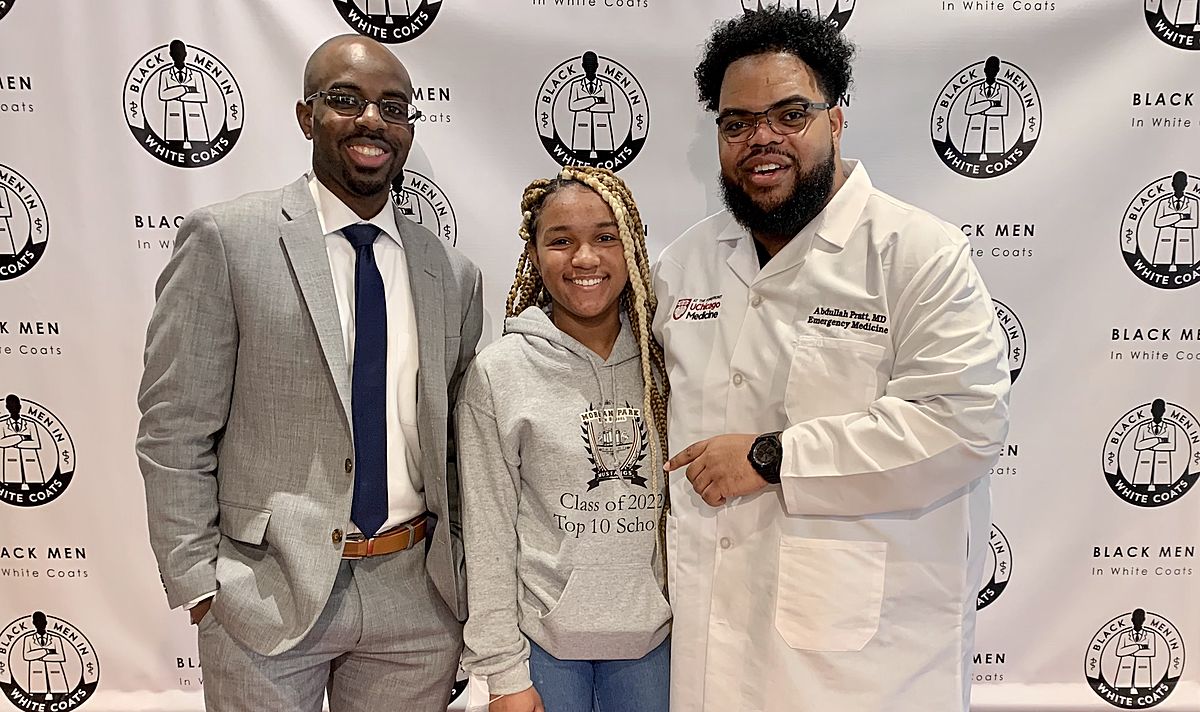When Abdullah Hasan Pratt, MD’16, was a second-year medical student at the Pritzker School of Medicine, he lost his beloved older brother, Rashad, to gun violence near their family home on Chicago’s South Side. After the news broke, the first call he received came from his mentor at Pritzker, William McDade, PhD’88, MD’90.
“He said, ‘I know it hurts, but you have to use this. Don’t let this just be a wound. Let it focus and galvanize you. Use these tears and this pain to motivate your journey,’” remembered Pratt.
Now an emergency medicine physician and assistant professor at Pritzker, Pratt is guided by McDade’s words daily. He was an advocate for the construction of UChicago Medicine’s Level 1 trauma center, mentors Black and Latinx students from high school through medical school, promotes violence reduction through organized sports programs in underrepresented neighborhoods, and much more.
Pratt is preparing to welcome a summer cohort of 50 high school students from the South and West sides to a seven-week session of the Medical Careers Exposure and Emergency Preparedness program (MedCEEP) on the UChicago campus in June. (For an online program application, due by May 20, 2021, click here.)
Pratt founded MedCEEP in 2018 in partnership with the University’s Office of Special Programs-College Prep and the UChicago Charter School. Today, it’s supported by the Provident Foundation, a South Side nonprofit that provides medical education scholarships and mentoring and is a core participant of the UChicago Community Programs Accelerator. More than 1,800 students from eight schools have completed the program to date: 300 pre-COVID-19, and 1,500 in virtual sessions during pandemic restrictions.
Pratt sees MedCEEP as a violence reduction program at its core. First, students learn to be leaders who have practical skills to intervene when violence happens, along with social and behavioral skills to help stop violence in their communities.
And, he says, training the next generation of health professionals to solve the problems made evident by the disproportionate impact of COVID-19 on Black and Latinx communities is a way to address the mental health issues, health disparities, and chronic disease that erode communities’ overall health.
“Violence reduction is preventative medicine,” he said. “We’re looking to help the community help itself.”
The “emergency preparedness” component of MedCEEP teaches first-aid skills so young people can step in and help with emergencies they might encounter in their neighborhoods, from recognizing signs of stroke, to what to do if a child is choking, to how to stop bleeding from a gunshot wound.
That part of the program “is about addressing health disparities, like long wait times for an ambulance,” Pratt said. It’s also about empowerment and encouraging action: “The lack of willingness to engage is rampant in the community, so we try to empower students by giving them the skills to respond rapidly and to act — to be a participant, even if it’s just by calling 911. We want them to be the solution.”

Students learn suturing, ultrasound skills, and CPR at Mitchell Hospital’s Simulation Center; operate the DaVinci surgical robot; tour the emergency department, trauma bays, and helipad; and more. “The guys, especially, love to learn those physical skills like doing chest compressions,” Pratt said, “and they can see how they and their friends might be able to help in that kind of situation.” Physicians, nurses, medical students, and medical professionals from all areas of the hospital volunteer to give tours and engage MedCEEP participants in hands-on learning.
In addition, the program improves health literacy and offers a safe space for students to talk about and process their experiences with violence — like a student from Pullman who saw her sister shot in the neck and chest. The sister has recovered, but the student “recalls seeing her sister collapse in her arms ... after our program, she feels like she’s that much closer to knowing what to do next time she sees something like that happen.”
And, Pratt said, that student now wants to become a trauma physician thanks to the other component of MedCEEP: introducing students to medical careers in the hope that they’ll pursue medical education and return to serve the communities where they grew up. According to the Association of American Medical Colleges, just 5.8% of all practicing physicians are Black and 5% are Latinx.
Panel discussions featuring Black and Latinx medical professionals alongside students in their fields are an especially popular part of the program. “We’ll have a paramedic on a panel with an EMT student, a doctor with a medical student,” Pratt said. “Our students light up when they get to see someone two to four years older than they are, who listens to the same music they do, who also has a brother with autism, or also lost a father to gun violence, and who’s on the pathway to a medical career.”

Erica Taylor, a junior at Morgan Park High School, attended HPREP, a program similar to MedCEEP, as part of her experience in the UChicago Collegiate Scholars program. She now plans to pursue a pre-med track in college (at Johns Hopkins University, she hopes), and this summer she’ll help Pratt run MedCEEP sessions.
“Dr. Pratt went to Morgan Park, too, and he was on the football team,” Taylor said. “A doctor came from Morgan Park! A lot of people don’t expect that. He had several opportunities, but wanting to stay in Chicago on the South Side to help people who look like him is pretty cool.”



